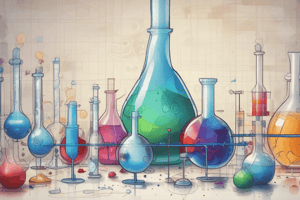Podcast
Questions and Answers
What is the main focus of analytical chemistry?
What is the main focus of analytical chemistry?
The identification, quantification, and characterization of substances.
Describe the first step in the analytical process.
Describe the first step in the analytical process.
Collecting a sample, which can be a solid, liquid, or gas.
What is the purpose of separation techniques in analytical chemistry?
What is the purpose of separation techniques in analytical chemistry?
To separate the components in a mixture for easier analysis and identification.
Explain how chromatography works.
Explain how chromatography works.
How does electrophoresis separate substances?
How does electrophoresis separate substances?
Why is sample preparation important in the analytical process?
Why is sample preparation important in the analytical process?
What is the main principle behind ion exchange chromatography?
What is the main principle behind ion exchange chromatography?
How is spectroscopy used in analytical chemistry?
How is spectroscopy used in analytical chemistry?
What industry uses analytical chemistry to ensure the purity and quality of drugs?
What industry uses analytical chemistry to ensure the purity and quality of drugs?
How does analytical chemistry contribute to environmental science?
How does analytical chemistry contribute to environmental science?
In which field of science is analytical chemistry used to identify and trace evidence at crime scenes?
In which field of science is analytical chemistry used to identify and trace evidence at crime scenes?
What is one of the challenges faced by analytical chemistry?
What is one of the challenges faced by analytical chemistry?
Study Notes
Exploring the World of Analytical Chemistry
Analytical chemistry is a captivating and essential branch of chemistry that focuses on the identification, quantification, and characterization of substances. This discipline is a critical tool in our quest to understand our world, from confirming the purity of a pharmaceutical drug to detecting the presence of pollutants in water. Let's dive into the world of analytical chemistry to learn more about its fascinating subtopics.
The Analytical Process
The analytical process begins with collecting a sample, which can be a solid, liquid, or gas. The sample must be prepared to ensure accurate results. This often involves extraction, filtration, or concentration of the substance of interest. The prepared sample is then subjected to various analytical techniques that separate, identify, and measure the components present.
Separation Techniques
Separation techniques are the cornerstone of analytical chemistry. They help to separate the components in a mixture, making it easier to analyze and identify each individual substance. Some common separation techniques include:
- Chromatography: This technique separates substances based on their affinity for a stationary phase and a mobile phase. Liquid chromatography (LC) and gas chromatography (GC) are common forms of chromatography.
- Electrophoresis: This technique separates substances based on their charge and size. It is commonly used to separate proteins, DNA, and RNA.
- Ion exchange chromatography: This technique separates substances based on their ionic charge. It is commonly used to remove ions from a solution.
Detection and Quantification
After the components have been separated, they must be identified and quantified. This is accomplished using various detection techniques and instruments. Some common detection techniques include:
- Spectroscopy: This technique measures the interaction between matter and electromagnetic radiation. Techniques such as UV-Vis spectroscopy, Fourier-transform infrared spectroscopy (FTIR), and nuclear magnetic resonance (NMR) are commonly used to identify and quantify substances.
- Mass spectrometry: This technique measures the mass-to-charge ratio of ions. It is used to identify and quantify molecules by analyzing their fragmentation patterns.
Applications of Analytical Chemistry
Analytical chemistry has numerous applications that contribute to various industries and scientific fields, including:
- Pharmaceutical industry: Analytical chemistry is used to ensure the purity and quality of drugs. It helps to identify and quantify the active ingredients and impurities in a drug formulation.
- Environmental science: Analytical chemistry is used to monitor and analyze pollutants in air, water, and soil. It helps to identify the sources of pollution and develop remediation strategies.
- Forensic science: Analytical chemistry is used to identify and trace evidence at crime scenes. It helps to determine the origin of substances and the sequence of events that led to a crime.
- Food science and nutrition: Analytical chemistry is used to analyze the composition and nutritional content of food. It helps to ensure the safety and quality of food products.
Challenges and Future Outlook
Analytical chemistry faces several challenges, including the need for faster, more sensitive, and more selective techniques. The development of new technologies, such as microfluidics and nanotechnology, is helping to address these challenges. The future of analytical chemistry is likely to be shaped by the integration of these emerging technologies and the continued refinement of existing techniques.
Analytical chemistry is an exciting and dynamic field that has the potential to significantly impact our lives. By understanding the fundamentals of this discipline, you can develop the skills needed to make important contributions to the scientific community and help shape the future of chemistry.
Studying That Suits You
Use AI to generate personalized quizzes and flashcards to suit your learning preferences.
Description
Delve into the captivating world of analytical chemistry, where substances are identified, quantified, and characterized. Learn about the analytical process, separation techniques like chromatography and electrophoresis, detection methods such as spectroscopy and mass spectrometry, and the diverse applications in pharmaceuticals, environmental science, forensic investigations, and food analysis.



